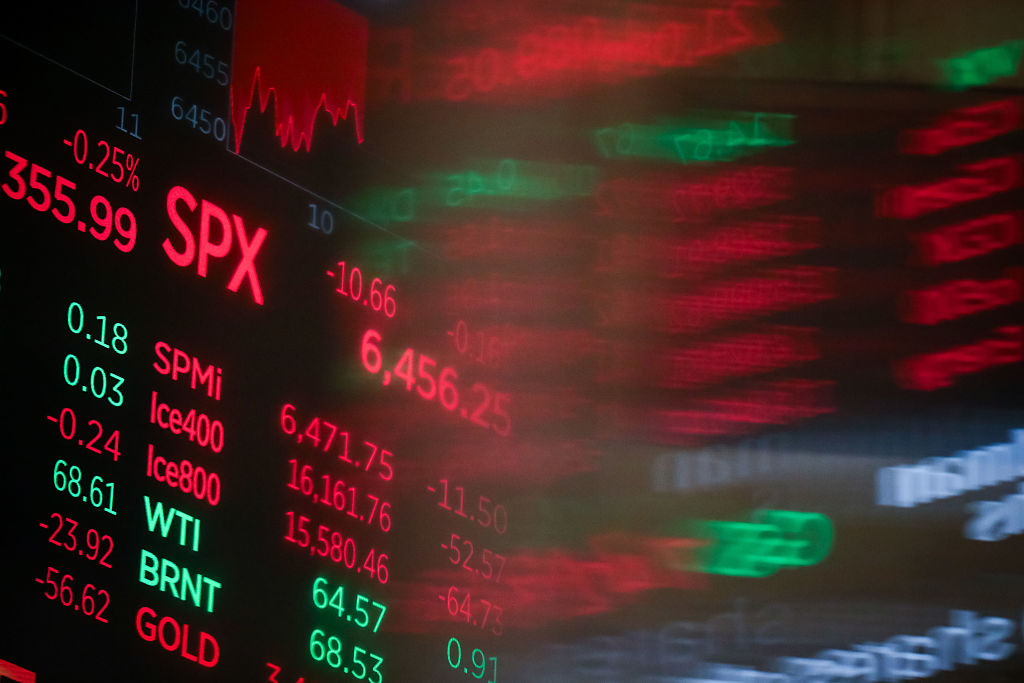16 Stock Picks for Risk-Averse Investors
Edward Jones' investment strategist is encouraging investors to diversify beyond the market's most stable sectors.

Profit and prosper with the best of Kiplinger's advice on investing, taxes, retirement, personal finance and much more. Delivered daily. Enter your email in the box and click Sign Me Up.
You are now subscribed
Your newsletter sign-up was successful
Want to add more newsletters?

Delivered daily
Kiplinger Today
Profit and prosper with the best of Kiplinger's advice on investing, taxes, retirement, personal finance and much more delivered daily. Smart money moves start here.

Sent five days a week
Kiplinger A Step Ahead
Get practical help to make better financial decisions in your everyday life, from spending to savings on top deals.

Delivered daily
Kiplinger Closing Bell
Get today's biggest financial and investing headlines delivered to your inbox every day the U.S. stock market is open.

Sent twice a week
Kiplinger Adviser Intel
Financial pros across the country share best practices and fresh tactics to preserve and grow your wealth.

Delivered weekly
Kiplinger Tax Tips
Trim your federal and state tax bills with practical tax-planning and tax-cutting strategies.

Sent twice a week
Kiplinger Retirement Tips
Your twice-a-week guide to planning and enjoying a financially secure and richly rewarding retirement

Sent bimonthly.
Kiplinger Adviser Angle
Insights for advisers, wealth managers and other financial professionals.

Sent twice a week
Kiplinger Investing Weekly
Your twice-a-week roundup of promising stocks, funds, companies and industries you should consider, ones you should avoid, and why.

Sent weekly for six weeks
Kiplinger Invest for Retirement
Your step-by-step six-part series on how to invest for retirement, from devising a successful strategy to exactly which investments to choose.
Edward Jones is a national brokerage and investment advisory firm that takes pains to avoid risk. Catering to conservative, long-term investors, the St. Louis-based firm won’t even consider recommending highly volatile stocks. And yet the company’s investment strategist worries that investors have taken risk-aversion too far. “They’ve loaded up on utility and telecom stocks -- the extremely stable, dividend-heavy segments of the market,” says Kate Warne. “We’re trying to convince them to diversify.”
Investors are understandably shell-shocked by a 12-year-long slump in stock prices marked by two massive downturns and a plunge last year that just missed entering bear-market territory. Also spooking investors is extreme volatility that rips away wealth as quickly as it’s given. But the fundamentals of both the U.S. economy and the health of public companies are improving, says Warne. That bodes well for future stock prices -- and particularly for companies in economically sensitive sectors, such as manufacturing and finance.
To be sure, the stock market is likely to deliver a bumpy ride, with any bad news about Europe, employment or earnings capable of trashing prices in the short run. Investing, however, is a long-term game. And for those who measure profits over decades rather than days, the opportunities abound.
From just $107.88 $24.99 for Kiplinger Personal Finance
Become a smarter, better informed investor. Subscribe from just $107.88 $24.99, plus get up to 4 Special Issues

Sign up for Kiplinger’s Free Newsletters
Profit and prosper with the best of expert advice on investing, taxes, retirement, personal finance and more - straight to your e-mail.
Profit and prosper with the best of expert advice - straight to your e-mail.
Warne is particularly enamored of industrial, technology and financial stocks, which she thinks investors have shunned in their flight to safety. Companies such as JPMorgan Chase (symbol JPM) and Dover Corp. (DOV) are selling at low price-earnings ratios even as they continue to grow steadily, she says. As of the February 17 close, JP Morgan, at $38.47, traded at 8 times projected 2012 earnings and yielded 2.6%. At $66.09, Dover, a diversified industrial company, traded at 14 times estimated 2012 earnings and yielded 1.9%.
Meanwhile, the experts at Edward Jones have buy ratings on 11 technology stocks, including Apple (AAPL), Google (GOOG), IBM (IBM), Intel (INTC), Microsoft (MSFT), Oracle (ORCL) and Qualcomm (QCOM). All of these companies are healthy, growing rapidly and producing prodigious amounts of cash, while selling for a relative pittance compared with earnings. And yet, with the exception of Apple, investors have been reluctant to purchase the stocks because many have lagged since 2000.
Jones considers Visa (V) and MasterCard (MA) to be technology stocks, too, because they derive the bulk of their income from transaction fees rather than loans. However, Jones recently downgraded both of the stocks. Warne explains that even though she likes the Visa and MasterCard business model, the companies now sport “hold” ratings because their share prices ran up so furiously in the past year that they now appear fairly valued and are unlikely to deliver market-beating results in the immediate future. From January 19, 2011, through February 17, shares of Visa jumped 68%, and those of MasterCard rocketed 69%.
Other stocks that Warne considers poised for profit:
Johnson Controls (JCI), a Milwaukee manufacturer, supplies car seats and consoles to about one-third of all new cars manufactured worldwide, Warne says. Because car sales have been soft the past few years, the nation’s auto fleet is now old by historic standards. As the economy improves, Warne says, people will start replacing their clunkers, and that will benefit Johnson. At $35.16, the stock sells for 13 times 2012 earnings estimates, and it yields 2.0%.
Suncor Energy (SU) is another of Warne’s favorites. The company produces petroleum products from Canada’s oil sands. At $34.29, it sells for just 10 times estimated 2012 earnings. The stock yields only 1.3%, but Warne expects the company to increase its dividend by roughly 10% annually.
In addition to JPMorgan Chase, Warne also favors BlackRock (BLK) in the financial sector. She thinks the world’s biggest money manager will benefit from a continuing rise in stock prices. Jones also has buy ratings on Morgan Stanley (MS), PNC Financial Services Group (PNC), U.S. Bancorp (USB) and Wells Fargo (WFC). What about Bank of America (BAC)? Jones rates it a “hold.” Shares of the badly beaten giant are just too risky, Warne says, largely because it’s unclear what will happen with the company’s loan portfolio and whether regulators will require the company to raise a significant amount of new capital. Until those questions are clear, Warne thinks BofA is too aggressive a bet for her company’s conservative clients.
Profit and prosper with the best of Kiplinger's advice on investing, taxes, retirement, personal finance and much more. Delivered daily. Enter your email in the box and click Sign Me Up.

-
 5 Investing Rules You Can Steal From Millennials
5 Investing Rules You Can Steal From MillennialsMillennials are reshaping the investing landscape. See how the tech-savvy generation is approaching capital markets – and the strategies you can take from them.
-
 The Tool You Need to Avoid a Post-Divorce Administrative Nightmare
The Tool You Need to Avoid a Post-Divorce Administrative NightmareLearn why a divorce decree isn’t enough to protect your retirement assets. You need a QDRO to divide the accounts to avoid paying penalties or income tax.
-
 When Estate Plans Don't Include Tax Plans, All Bets Are Off
When Estate Plans Don't Include Tax Plans, All Bets Are OffEstate plans aren't as effective as they can be if tax plans are considered separately. Here's what you stand to gain when the two strategies are aligned.
-
 If You'd Put $1,000 Into AMD Stock 20 Years Ago, Here's What You'd Have Today
If You'd Put $1,000 Into AMD Stock 20 Years Ago, Here's What You'd Have TodayAdvanced Micro Devices stock is soaring thanks to AI, but as a buy-and-hold bet, it's been a market laggard.
-
 Nasdaq Leads Ahead of Big Tech Earnings: Stock Market Today
Nasdaq Leads Ahead of Big Tech Earnings: Stock Market TodayPresident Donald Trump is making markets move based on personal and political as well as financial and economic priorities.
-
 If You'd Put $1,000 Into UPS Stock 20 Years Ago, Here's What You'd Have Today
If You'd Put $1,000 Into UPS Stock 20 Years Ago, Here's What You'd Have TodayUnited Parcel Service stock has been a massive long-term laggard.
-
 Visa Stamps the Dow's 398-Point Slide: Stock Market Today
Visa Stamps the Dow's 398-Point Slide: Stock Market TodayIt's as clear as ever that President Donald Trump and his administration can't (or won't) keep their hands off financial markets.
-
 Stocks Climb Wall of Worry to Hit New Highs: Stock Market Today
Stocks Climb Wall of Worry to Hit New Highs: Stock Market TodayThe Trump administration's threats to Fed independence and bank profitability did little to stop the bulls on Monday.
-
 Dow Hits a Record High After December Jobs Report: Stock Market Today
Dow Hits a Record High After December Jobs Report: Stock Market TodayThe S&P 500 also closed the week at its highest level on record, thanks to strong gains for Intel and Vistra.
-
 Nasdaq Takes a Hit as the Tech Trade Falters: Stock Market Today
Nasdaq Takes a Hit as the Tech Trade Falters: Stock Market TodayThe Dow Jones Industrial Average outperformed on strength in cyclical stocks.
-
 Dow Hits New High Then Falls 466 Points: Stock Market Today
Dow Hits New High Then Falls 466 Points: Stock Market TodayThe Nasdaq Composite, with a little help from tech's friends, rises to within 300 points of its own new all-time high.